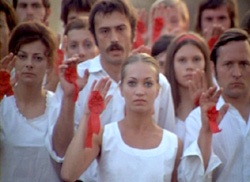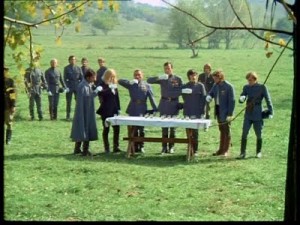The great Hungarian filmmaker Jancsó Miklós (or Miklós Jancsó, as he is known in the West) died peacefully in his sleep on January 31, 2014. Mehelli Modi, who has released excellent DVD editions of some of his films on Second Run in the U.K. (and has more recently brought out a Blu-Ray of his remarkable 1974 Electra, My Love), emailed me a couple of weeks later, asking, on behalf of Jancsó’s sons Nyika and David, if I could write something to be read at his memorial service on February 22. Here is what I sent back. — J.R.
It would hardly be an exaggeration to say that I regard Jancsó Miklós as one of the great lost continents of world cinema, especially outside Hungary — and largely, I suspect, because Hungarian history, which forms a major part of his oeuvre, is another lost continent from the vantage point of the West. With the possible exception of Sergei Eisenstein, I suspect that Jancsó remains the supreme example of a film artist who views history as a multilayered and passionate form of pageantry, something to be sung and danced, by the camera as well as by the actors, and, speaking more figuratively, by the audience. And it may be that Western audiences have lost touch with his magic because, figuratively speaking, they still don’t know the words to his lovely songs (apart from those in English in Red Psalm). But the tragic beauty — the transports — of the melodies, the movements, the colors, and the gestures of Jancsó’s films remain.
Although I’ve been fortunate enough to have seen the first episode or two of his nine-part miniseries Faustus Faustus Faustus during my first visit to the Rotterdam Film Festival in 1984, after having seen a half dozen of his 1960s and 1970s masterpieces in New York and Paris (most memorably, The Red and the White and Red Psalm), I regret to say that most of the remainder of his vast filmography, about two dozen titles, has so far been a closed book to me, inaccessible and tantalizing. In 1984, I was dazzled by what I saw of Faustus Faustus Faustus, and the only reason why I didn’t see it all at the time was that I wrongly assumed, after hearing that it would be shown on England’s Channel 4, that I would have more opportunities to do so. But I was at least fortunate enough to meet Jancsó in Rotterdam, most likely that same year, thirty years ago. And I eagerly await the prospect of savoring more of his unique transports.
Jonathan Rosenbaum


